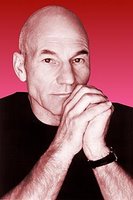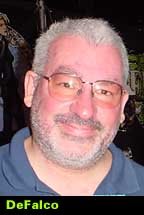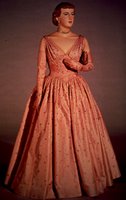Fingeroth ran Marvel Comics’ Spider-Man editorial line and is the author of Superman on the Couch: What Superheroes Really Tell Us About Ourselves and Our Society. O’Neil, an expert on comics, pop culture, and folklore/mythology, was the guiding force behind DC Comics’ Bronze Age reinvention of Batman. Uslan, an Emmy Award-winning writer and producer, is executive producer of the Batman films. DeFalco, former Marvel editor-in-chief, is the author of Spider-Man: The Ultimate Guide. Dr. Arnold T. Blumberg is Curator of Geppi’s Entertainment Museum in Baltimore, Maryland, and has edited, authored or co-authored a number of comic and pop culture guide books. He teaches a course in comic book literature at the University of Maryland Baltimore County (UMBC).
It was a nice event for both the laymen and the comic book fan. Not only did everyone stay till the end of the two-hour program, most people stayed longer, and the Smithsonian staff seemed pleased by the attendance (since tickets were $25 a pop).
Bad news was, during the Q&A portion there were uncomfortable descents into fanboy wrangling between some of the audience and the panelists that left even hardcore comics-type like me squirming. The good news was, it was entirely focused on Spider-Man, which made Marvel fans look geeky and DC fans look adult and sophisticated. Nyah-nan-nah-na-nah, Marvel!
Seriously, panel discussions -- not just about comics but about anything -- should never be opened up to Q&A. I'm there to see the panelists interact, not listen to some mouthbreather charging that Spider-Man working with Iron Man is a violation of his core character while the panelists eye the exits. And that was the moderator.
I didn't learn too much, but these events are more about hearing where particular experts come down on certain issues, not for eye-popping relevations about comics' role in society (particularly for those of us who think, read, and write about such things alot; like, daily).
Best News of The Evening
 Michael Uslan was an engaging speaker, with lively anecdotes and that rarest of combinations, a strong love of comics coupled with an understanding of how the real world works. He made three observations I found particularly interesting. First, Hollywood's attitude toward comic book movies has changed because the people now running Hollywood grew up reading comics. Second, Hollywood understands that "comic book movie" is not a genre. Genres wax and wane in popularity, but comics are a medium, which supplies source material in any genre. This means that the comic book movie is not a fad. Third, he predicts that we're on the verge of the next step in transmedia adaptations: quality television miniseries based on graphic novels too difficult to condense into a film.
Michael Uslan was an engaging speaker, with lively anecdotes and that rarest of combinations, a strong love of comics coupled with an understanding of how the real world works. He made three observations I found particularly interesting. First, Hollywood's attitude toward comic book movies has changed because the people now running Hollywood grew up reading comics. Second, Hollywood understands that "comic book movie" is not a genre. Genres wax and wane in popularity, but comics are a medium, which supplies source material in any genre. This means that the comic book movie is not a fad. Third, he predicts that we're on the verge of the next step in transmedia adaptations: quality television miniseries based on graphic novels too difficult to condense into a film.Pleasant Unfortunate Truth

During the discussion on the portrayal of women heroes in comics, Denny O'Neill talked about his decision to depower Wonder Woman. Denny was (and is) by his own description a "pinko liberal", and affirmed that he thought the change was an advance for women characters. "You have to understand, " he said, "writers like me, we have the best of intentions. We simply don't always know how to do things well. But things are better now that there are more women writers." I've always assumed that was true, but it was nice to hear: writers aren't intentionally sexist, or racist, or out to ruin your favorite character.
[Oh, and I know that's not Denny O'Neill, but I couldn't find any pictures of him, and he looks sort of like Patrick Stewart, except for the nose.]
 Unpleasant Unfortunate Truth
Unpleasant Unfortunate TruthWell ... most writers aren't. When asked a question about the social ramifications of editorial decisions, Marvel's Tom DeFalco stated quite baldly: "We don't really think about things that like. We're just trying to sell books." In fact, he said, to some degree, "a writer's job is to piss off the readers," citing several instances where the louder the public condemnation of what he was doing with certain characters, the higher sales went. "
Rape is Real!
Naturally, someone from the audience just had to bring up the whole "Dr. Light/rape" thing.
Marvelites DeFalco and Fingeroth both said they simply wouldn't permit such a thing in a story. Apparently Marvel's vaunted realism includes Life Model Decoys but not a crime that victimizes, oh, around 600,000 women in the U.S. a year. O'Neill, although not exactly gung-ho on the idea, noted that what matters is how the subject is treated and how it serves the storyline; hey, this is the guy who wrote the Question series, remember.
The most interesting thing about the "rape discussion" was that the only person who'd actually read the story at issue was Uslan.
By Far the Best Exchange of the Evening
Denny O'Neill (charmingly self-deprecating): "Back when I was first working in comic books, the public considered us only half a step up from pornographers--"
Tom DeFalco (interrupting so as to steal the limelight with a lame joke, just as I'd expect a Marvel writer to do): "You mean half a step below!"
"Well," Denny immediately replied, casually withering in the superiority of his grise-y eminence: "Maybe at Marvel."
 ZING! Denny's a very smart and witty guy, whom the years have sharpened, not dulled. I'd love to have him at one of my parties, but I'd be terrified to be on a Match Game '74 panel with him. Suffice it to say, that between the, ahem, earthiness of DeFalco and the urbanity of O'Neill my company prejudices were not undermined, but strongly reinforced (which actually saddened me, you'll be surprised to hear).
ZING! Denny's a very smart and witty guy, whom the years have sharpened, not dulled. I'd love to have him at one of my parties, but I'd be terrified to be on a Match Game '74 panel with him. Suffice it to say, that between the, ahem, earthiness of DeFalco and the urbanity of O'Neill my company prejudices were not undermined, but strongly reinforced (which actually saddened me, you'll be surprised to hear).OVERALL

I'm delighted that the Smithsonian sponsored such a panel, and that I got to attend. It's a good sign they've got their finger on the pulse of current culture and know that there's more to U.S. history than Mamie Eisenhower's dress. Lovely though it is.
It was a nice mix of people and perspectives, but Devon had a more interesting idea: a panel "pitting" the Old Comics Guard versus the New Comics Guard (maybe even including some ... some GIRLS!).

Charles Nelson Reilly is a god among men!
ReplyDeleteAnd that O'Neill/DeFalco exchange made my afternoon!
The Fingeroth book is worth reading.
ReplyDeleteAs for DeFalco, the man is a hack. When I was a wee teen I was saying, "Please someone tell DeFalco he cannot write. Please."
CNR is also a goddess among women.
ReplyDeleteI have never read anything DeFalco has written; I was, however, resoundingly anti-impressed with him in person.
I remain quite fond of DeFalco's mid-eighties run on The Amazing Spider-Man. His "earthiness" works well with the character. His other work didn't do all that much for me.
ReplyDeleteThe Denny O'Neil Question series...now that was interesting. Not always great, but always worth reading. Plus: mullets and kung fu!
Man. Had I known about this panel, I would have been there. (Possibly with a large wooden mallet to silence the more obnoxious of my dorkish brothers-in-nerd.) Argh.
Totally on a tangent here, but in 2003 I had surgery and was stuck laying in bed for 2 weeks on a constant supply of oxycodone and oxycontin.
ReplyDeleteI was having mild hallucinations and such from the drugs and at the time, Game Show Network was running Match Game about 6 times a day (all different episodes and eras).
Now I've always been a fan of Match Game since I was a kid. Being laid up in bed on major drugs for weeks was horrible and watching Charles Nelson Reilly while on drugs several times a day was one of the most surreal experiences I've ever had.
Ok. I return you now back to your comics blogging.
(Oh. And I love Brett too!)
Good God, Defalco's run on Fantastic Four pretty much destroyed that book. Even the Jim Leeified "Heroes Reborn" could only have been a step up.
ReplyDeleteCaptain Picard, as Transmet readers know, does in fact read comic books.
Yes, rape is real and happens to a lot of women in real life, but there are several reasons why it would not be appropriate for it to appear in a Marvel comic right now.
ReplyDeleteUnfortunately it's in Squadron Supreme this very month, which as I recall is published by Marvel. In fact it's been in a lot of Marvel comics and a lot of DC comics in recent years.
Or maybe they mean that they wouldn't have it occur in the main story. But it would be okay to toss it in as character background like Marvel did for Black Cat or Rogue.
Because otherwise, unless they are only talking about their personal writing (which I have no idea about), they either have no clue what they are talking about or they are working from a different definition than the rest of us.
But honestly, Scip. The LAST thing we need right now in comics is more rape stories.
They meant "not at all". As in, "crime = robbing banks".
ReplyDeleteTo me, most of this criticism of rape as a theme or occurence in comic books might as well be cribbed directly from "Seduction of the Innocent".
My own dislike of Tom DeFalco stems from two things:
ReplyDelete1. His tenure as editor-in-chief, when he spent a lot of time wallowing in a morbid nostalgia for the Lee/Kirby era. Which meant many, many covers drawn by Ron Frenz in an awful, whacked-out Kirby imitation with screwy perspective and questionable anatomy, plus lots of jaggedy-edged caption boxes. I was looking for comics to go in new directions, and it felt like DeFalco was dragging Marvel backwards into a pallid copy of the past.
2. In his first issue of "Thor" after the Simonson run, he had Thor get his sexy beard shaved off, not just because Thor's face had finally healed, but -- according to Sif -- because Thor was always complaining about how itchy it was. (Yeah, I don't remember him doing that, honey.) And yet DeFalco himself had a beard back then. And he still does, I see! Yeah, yeah, it's an extremely petty reason on my part, but it's just something that always stuck in my craw. *attempts to calm down by stroking sweet-ass goatee*
I liked DeFalco's runs on Spider-Man, Thor and the Fantastic Four. Yes, he had a love for a retro-style, but he also understood the characters really well - despite those who thought his FF was out of character, he had a good knack for knowing how the team would react in extremely adverse situations. So a lot of people rejected it because it was a little different, but he really put them through the wringer - reinjected some of the original grittiness that Lee and Kirby had given the characters before they got too comfortable and familiar under later writers. Surprisingly subtle work.
ReplyDeleteSeduction of the Innocent covered overplayed hack writing techniques? Here I thought it was all homophobia and censorship.
ReplyDeleteAll joking aside, you have a point. People are focusing too much on "OMG such graphicness in a comic!" and not enough on "It's in pretty much every heroine's backstory by now, give it a rest already."
I read the Absorbascon expecting there to be a requisite level of Marvel-bashing. Like watching Fox News, you have to know you're gonna get a certain type of product in a certain way, and you'd best abandon all hope before ye enter.
ReplyDeleteBut come ON, Scip. Saying something like (interrupting so as to steal the limelight with a lame joke, just as I'd expect a Marvel writer to do): is just silly, especially when you haven't read his work. Besides, Fingeroth hasn't been involved with anything involving Marvel for years, and the only thing DeFalco is doing is "Spider-Girl," which features a prominent, intelligent, smart, and relatable female character (who's never been raped) as its hero, and which lasted 100 issues thanks to a constant groundswell of support from the fans that it not be canceled. Unfortunately, it looks like this time is the end, but I digress.
In fact, the more I think about it, the more the twist amuses me--you're slagging a guy whose work you've never read because of the way he comes off in person, when his current work is (in my less-than-modest opinion) something you might like. In point of fact, "Spider-Girl" was often hailed as the antidote to the excessive grimness and nastiness of Marvel output, rightly or wrongly.
I used to dislike DeFalco intensely, for many of the reasons cited above. But I've reconsidered that because the guy really loves his work--he loves to write comics, and it shows. That counts for a lot--I still wish he hadn't shaved Thor's beard or gotten rid of the armor, though. :)
"Saying something like (interrupting so as to steal the limelight with a lame joke, just as I'd expect a Marvel writer to do): is just silly, especially when you haven't read his work."
ReplyDeleteSaying something like that is just silly, since I was there and you were not.
I have no comment on his work. He was personally off-putting in the pushy way that I would stereotype a Marvel writer; I was saddened to see my stereotype, which I was hoping was mostly predjudice on my part, reaffirmed.
I wasn't commenting on what he said, but on what you said. You're right--I wasn't there, and I wish I had been, because it sounded like it'd be right up my alley.
ReplyDeleteBut you admit that it's a stereotype, which is the crux of my beef, if you will.
I was actually thinking about this, and it reminds me of why people hate on John Byrne. I told Devon and the crew that I stopped buying anything Byrne does because he makes odious statement after odious statement, and I didn't want to support anyone who could be so obnoxious by patronizing their work. By this standard, you would be right not to support any of his work, because you dislike his personality. Fair enough.
But to say that this symbolizes all Marvel writers does them a disservice, just like saying all DC writers are fetishistic about recreating the Silver Age. Is there truth in these opinions? Yes. Is it the WHOLE truth? No.
I judge John Byrne individually and say that he's an ass, and buying his work just gives him license to be an ass. You judge all of Marvel by Tom DeFalco's behavior and say "This proves they're all jerks." That's cheap reasoning, which you admit to.
And again, it kills me that the guy you are using to justify why Marvel is weaker than D.C. writes (or wrote) a book that was more "DC-esque" than ANYTHING Marvel has put out in the last half-decade or so. Wacky fun, as they say. :)
"You judge all of Marvel by Tom DeFalco's behavior and say "This proves they're all jerks." "
ReplyDeleteI do? That's funny; I don't see that anywhere in my post.
In fact, I've already judged all of Marvel, which is why I had a "pre-judgment", a prejudice against what I imagine as a stereotypical Marvel writer. As stated in my post, by the way.
Yes, I have a stereotype of what such a person would be like; it is not based on vast personal experience with those people but on second-hand knowledge; that is why I call it a stereotype.
Stereotyping is a natural animal phenomenon; animals are not scientists and do not insist on making a hundred trials before determining whether an eagle is a threat or people wearing workboots mean to harm them. As a survival mechanism, animals, humans included, make rapid judgments designed to minimize the likelihood of encountering something they don't like. Like Joe Quesada, for example.
Sometimes, such judgments are hastily generalizations. Dogs, for example, during the impressionable stage of their puppyhood will fixate on some external characteristic of someone who appears to threaten them and come to the conclusion that, for example, "people with workboots mean me harm." Canine behavious therapy often focuses on unlearning such conclusions.
Similarly, people make such judgments about their likes and dislikes. Quite often, they are right. After reading one Anne Rice novel and hating it, I don't feel the need to read them all before concluding, "I don't like Anne Rice novels"
But sometimes those judgments are quite in error. It is not making judgments that is wrong, it is an unwillingness to change those judgments when faced with additional evidence.
Usually, when I hold some negative stereotype about any class of people, I hope that actual direct encounters with such people will counter it.
Lo and behold, DeFalco, instead of countering my stereotype as might be hoped, reaffirmed it, which I found disappointing.
I would much rather he had been charming.
Well, he was quite charming when I met him briefly at a convention many years ago. Seemed honestly happy to sign some silly book or other I had on me at the time.
ReplyDeleteScipio,
ReplyDeleteI don't understand the basis for the distinction between marvel and dc writers. At least not in the present time. Waid, Morrison, Johns, Simone & Busiek have all done time at Marvel, right? And Millar (and I assume others) has done time at DC. Further, there's no reason to think that some of the current DC brain trust might go back to Marvel (though I hope not).
I understand why someone might have stereotypes for marvel and dc fans, but I don't see a strong enough distinction between the writers to generate a stereotype.
Are you thinking of a previous generation of writers? Were there more hardline distinctions in, say, the 70s and 80s, then now?
By the way, I feel that I should let you know that your blog is partly responsible for me getting back into super hero comics, and especially with helping convince me of the merits of DC. So thanks.
Best, Alex P
I'm flabbergasted that you include such an unwarranted disparaging remark toward the moderator. "Mouthbreather?" Were you really at the same event? I didn't see anyone else up there who had a doctoral degree, and he kept the whole thing rolling all night long. He was great when I talked to him afterward and I couldn't imagine being so disrespectful. I have a hard time taking anything else you say seriously.
ReplyDeleteMichael D.
You might enjoy this interview with former Spider-Man comics group editor Danny Fingeroth. Fingeroth is also the editor of "Disguised as Clark Kent" and "Superman on the Couch," and is editor of "Write Now! magazine.
ReplyDelete